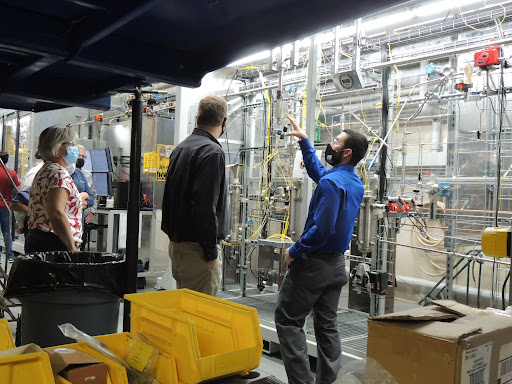REG, ISU collaborate on renewable diesel research project

BPC Staff Oct 5, 2021 | 3:57 pm
2 min read time
545 wordsAll Latest News, Energy, Innovation and EntrepreneurshipA small group tours the new hydrotreater renewable diesel research facility at the Iowa State University BioCentury Farm west of Ames on Monday. Photo by Michael Crumb
Officials from Renewable Energy Group and Iowa State University celebrated a new pilot project Monday that brings together the technology and expertise of both organizations to better understand how biomass and feedstocks can play a role in the production of renewable fuels.
The pilot project is the result of a three-year collaboration between Ames-based REG and the ISU Bioeconomy Institute. A ribbon-cutting ceremony was held and small-group tours were given of the new hydrotreater plant, located at the ISU BioCentury Research Farm west of Ames.
According to REG officials, renewable diesel is a low-carbon fuel that can convert feedstocks into a hydrocarbon fuel that is chemically similar to traditional diesel through a process using heat, pressure and hydrogen, known as hydrotreating. Research at the hydrotreater plant near Ames will support REG’s Geismar, La., renewable diesel plant by evaluating new low-carbon feedstocks and optimize production of renewable diesel and sustainable aviation fuel.
The hydrotreater plant is fully automated and can operate for weeks at a time.
REG President and CEO Cynthia Warner said the project is the next step in the company’s innovation.
She said the hydrotreater plant will allow researchers to run three experiments simultaneously that will advance the proprietary technology used at the Geismar plant, the first renewable diesel plant in the country.
“These pilot plants will help us continue to lead the way for the United States,” Warner said. “Growth is so important to our mission of sustainability. The more we produce the more we decarbonize, and feedstock abundance is one of the keys to our growth.”
Warner said REG has been able to convert 14 types of feedstock into biodiesel.
“We look forward to continuing to foster this concept of feedstock abundance, which is so important to our growth and mission … and we’re going to do that through this innovation,” she said. “Our work here will help us experiment with new feeds and optimize our ability to process the existing ones.”
What’s learned at the pilot plant will be put to immediate use at the Geismar plant, which will be producing 90 million gallons a year. The company is in the process of expanding the Louisiana plant, adding 250 million gallons of capacity a year, Warner said.
REG operates 12 biorefineries in the U.S. and Europe, and produced 519 million gallons of renewable fuel in 2020, officials said.
Iowa State University President Wendy Wintersteen said the collaboration between ISU and REG is a continuing example of the public-private work that needs to take place to reach carbon-reduction goals.
“This is really just the start of something very different, something very special, something that will make a difference in the work we have to do to get to our goals related to carbon and agriculture, and all aspects of agriculture can play a big role in helping this country address the issues we face with climate change,” she said.
Editor’s note: This story has been updated to clarify that REG and Iowa State are collaborating on a renewable diesel project, and that the company’s Geismar plant was the first renewable diesel plant in the country.










